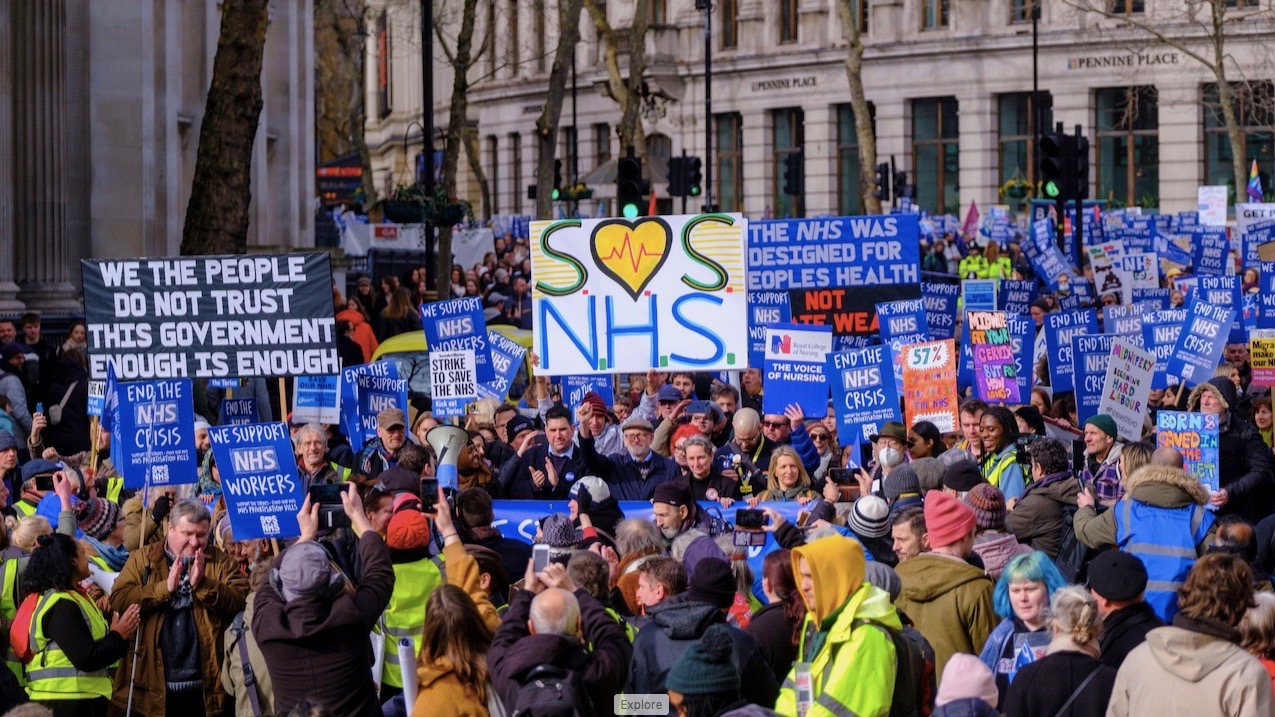The National Health Service (NHS) in the United Kingdom celebrated its 75th anniversary on July 5. Public opinion polls indicate that pride in what the NHS stands for is widespread among patients and healthcare workers, but years of underfunding have contributed to a rise in health inequities throughout the country.
NEW: How does the public view the NHS on its 75th anniversary?
A thread 🧵 of six key findings with @IpsosUK1. 54% of people said our national health service makes them most proud to be British, more than our history, our culture, our system of democracy or the royal family. pic.twitter.com/7Szi3RlPBu
— The Health Foundation (@HealthFdn) July 3, 2023
During a workshop on creating a just healthcare system, held during a People’s Health Assembly in Scotland, one group of participants reflected on the NHS in Scotland and discussed ways to improve the system for patients and the workforce. The group recognized that achieving change within a broken system is not easy, but they drew upon their own experiences to identify areas where it could still be implemented. The group included a diverse range of professionals, such as a hospital doctor, a doctor studying at the university, a General Practice Link Worker (practitioners providing non-medical support with personal, social, emotional and financial issues), a worker involved in community-based public health projects, and two representatives from community organizations.
Undermined by political antipathy
Past administrations have expressed their antipathy towards the NHS by underfunding it and turning towards the private sector. This has been less evident in Scotland compared to other parts of the UK, but still the public health system is characterized by burnt out staff, limited time within appointments, long waiting times, post-COVID-19 effects and lack of planning for a new pandemic. Due to lack of resources, the healthcare system works on a reactionary basis, failing to prevent ill health and deterioration of conditions before intensive action is needed.
The political sentiment towards the NHS extends to the system of medical education as well. A sense of hierarchy is ingrained in medical training, and discriminatory language goes unchallenged. At the same time, medical education barely covers health inequality or public health. These topics are mostly approached in an uninteresting way, failing to instill a sense of the importance of health equity among students.
The current model of medical education creates barriers between health workers and patients. This feeling is reinforced by policies that pit the interests of workers against those of the people they care for. Workers are patients too, and they share issues such as financial worries, experiences of gender-based violence, housing insecurity, and poverty.
A just healthcare system would work to support not only patients but also the workforce. Creating more accessible routes to healthcare professions and reducing the level of gatekeeping in medicine could allow those who cannot obtain a medical degree to contribute to the delivery of services and promote a more sustainable, healthier workforce.
In addition to that, one of the biggest steps towards building a stronger and healthier workforce would be ensuring a decent working wage for all.
Building a more open NHS
It has to be said that health workers are not the only ‘experts’ on health. Many people in the community have knowledge on health and well-being and know what can be done to improve their condition. People are willing to take more ownership of their health but are often not equipped to do so, with professionals currently being the gatekeepers to the necessary resources.
Developing health partnerships with communities on the ground is essential to address the gap between policy and practice, as policy is slow to react to public and service demands.
There are already successful examples of how this can be done, with link workers being introduced in GP practices following initiatives like Inequalities Sensitive Practice and Healthier, Wealthier Children. The Alliance in Glasgow now employs approximately 100 link workers and more of them are present throughout Scotland.
Link workers possess knowledge of their communities and contribute to the creation of grassroots health partnerships. This and similar initiatives could lay the groundwork for an NHS that is more open to people’s inputs, further strengthening support for the public health system among patients and health workers alike.
No organization achieves 75 years of service without success. In Scotland, the UK, and across the globe, the right to health is a fundamental human right and a cause we tirelessly fight for. While we need to make changes to our current practices to remain relevant and efficient, the flaws and areas for improvement in the NHS are currently being exploited to support ideologically-driven policies that gradually and explicitly privatize our healthcare system. Our battle in the UK may not be solely about implementing universal health coverage, but it certainly revolves around safeguarding and preserving the right to health for all.
Jackie Erdman worked in Glasgow until retirement and in the NHS for 20 years. Her most recent post was as Head of Inequalities and Human Rights in NHS Greater Glasgow and Clyde. She is currently a trustee for Environmental Rights Centre Scotland, and chair of the Board for Homeless Network Scotland.
Mohasin Ahmed is a Public Health Practitioner at Glasgow Centre for Population Health, specializing in community engagement in research. She has a background in mental health advocacy, specifically for LGBTQIA+ and racialized communities, and is currently a Director on the board of Saheliya and chair of the board at QTIPOC+ charity Exhale.group.
People’s Health Dispatch is a fortnightly bulletin published by the People’s Health Movement and Peoples Dispatch. For more articles and to subscribe to People’s Health Dispatch, click here





